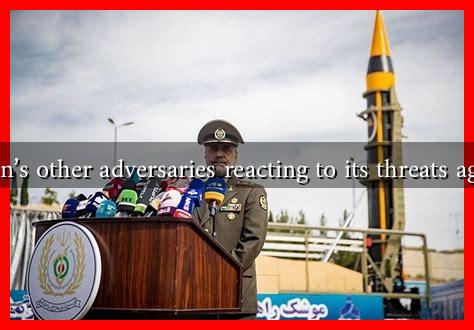-
Table of Contents
How are Iran’s Other Adversaries Reacting to Its Threats Against Israel?
Iran’s threats against Israel have long been a source of tension in the Middle East, impacting not only the Israeli-Palestinian conflict but also the broader geopolitical landscape. As Iran continues to assert its influence in the region, its adversaries—including the United States, Saudi Arabia, and other Gulf states—are responding in various ways. This article explores how these nations are reacting to Iran’s provocations and the implications for regional stability.
The Context of Iran’s Threats
Iran has consistently positioned itself as a staunch opponent of Israel, often using inflammatory rhetoric and supporting militant groups like Hezbollah and Hamas. The Iranian leadership views Israel as a primary adversary, which they accuse of oppressing Palestinians and destabilizing the region.
. Recent threats have included military posturing and calls for resistance against Israel, particularly in light of ongoing conflicts in Gaza and the West Bank.
U.S. Response: Diplomatic and Military Posturing
The United States, a key ally of Israel, has responded to Iran’s threats with a combination of diplomatic efforts and military readiness. The Biden administration has sought to re-engage with Iran through negotiations over its nuclear program while simultaneously reinforcing its commitment to Israel’s security.
- Military Presence: The U.S. has increased its military presence in the region, deploying additional naval assets to deter Iranian aggression.
- Sanctions: The U.S. continues to impose sanctions on Iranian officials and entities involved in supporting terrorism, aiming to limit Iran’s ability to fund militant groups.
- Support for Israel: The U.S. has reiterated its support for Israel, providing military aid and advanced weaponry to ensure its defense capabilities.
These actions reflect a dual strategy of deterrence and diplomacy, aiming to curb Iran’s influence while maintaining stability in the region.
Saudi Arabia: A Cautious Approach
Saudi Arabia, another significant adversary of Iran, has taken a more cautious approach in response to Iran’s threats against Israel. The Kingdom is particularly concerned about Iran’s growing influence in Iraq, Syria, and Yemen, which poses a direct threat to its national security.
- Strengthening Alliances: Saudi Arabia has sought to strengthen its alliances with other Gulf states and Israel, recognizing the shared threat posed by Iran.
- Covert Cooperation: Reports suggest that Saudi Arabia and Israel have engaged in covert cooperation, particularly in intelligence sharing and military planning.
- Public Relations: The Kingdom has also worked to reshape its public image regarding Israel, emphasizing the need for regional stability and security.
This cautious yet strategic approach reflects Saudi Arabia’s desire to counter Iran without escalating tensions into open conflict.
Other Gulf States: A Unified Front
Other Gulf states, including the United Arab Emirates (UAE) and Bahrain, have also reacted to Iran’s threats by forming a more unified front. Following the Abraham Accords, these nations have normalized relations with Israel, viewing it as a counterbalance to Iranian aggression.
- Economic Cooperation: The UAE and Bahrain have engaged in economic partnerships with Israel, fostering trade and investment as a means of strengthening ties.
- Joint Military Exercises: Gulf states have participated in joint military exercises with Israel and the U.S., enhancing their defense capabilities against potential Iranian threats.
- Public Statements: Leaders from these nations have publicly condemned Iran’s aggressive rhetoric, emphasizing the need for regional stability.
This collaborative approach among Gulf states signifies a shift in regional dynamics, as they increasingly view Iran as a common adversary.
Conclusion: A Complex Geopolitical Landscape
Iran’s threats against Israel have elicited varied responses from its adversaries, each navigating a complex geopolitical landscape. The U.S. continues to balance diplomacy with military readiness, while Saudi Arabia and other Gulf states are forging new alliances to counter Iranian influence. As tensions persist, the actions of these nations will play a crucial role in shaping the future of Middle Eastern stability.
In summary, the reactions to Iran’s threats highlight the intricate web of alliances and rivalries in the region. The ongoing developments will require careful monitoring, as the potential for conflict remains ever-present. For further insights into Middle Eastern geopolitics, you can explore resources from the C-SPAN.





